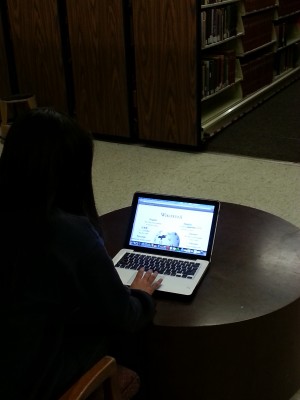Students Should Be Allowed To Cite Wikipedia
May 2, 2014
Wikipedia: It’s the crowdsourced knowledge engine that’s free to read, write and edit for everyone. It’s the collaborative project of over 300,000 people writing in 287 languages. But it’s more than that: It’s a taboo.

You know what I’m talking about. You’re writing a paper, you Google your topic, and the search returns that first, magical article: the Wiki page. Perfectly free of tedious language, abstractions or scholarly euphemisms, it gives you what you need. You go to Encyclopedia Britannica; you look up the article on your topic. You see a few dry, grammatically correct lines interspersed with the same facts you saw on Wiki. “Good enough,” you think, and you footnote it.
Maybe you get fancy: Instead of looking for another encyclopedic source, you scroll down to Wikipedia’s list of citations. You open the pages, skim them for relevance and add them to your bibliography.
I bet I can count on one hand the percentage of Fordham students who cannot recount one of these experiences. From here, you might think that I’m going to argue, “Everyone already cites Wikipedia by proxy, so let’s be honest and give the site the credit it deserves.”
But the ban on Wikipedia in academic circles is not a problem of denial—it’s a problem of culture.
There is no good reason not to consider Wikipedia a credible source. According to a 2005 article, “Can you trust Wikipedia?” in The Guardian, when experts compare Wikipedia, page by page, to conventional encyclopedias, Wikipedia wins. Additionally, Wikipedia articles are more neutral than many textbooks. Consider Texas: In 2010, James McKinley reported for the New York Times that nearly 5 million of Texas’ textbook-reading students saw Thomas Jefferson (coiner of the phrase, “separation of church and state,”) erased from a list of figures whose writings inspired the revolutions of the 17th and 18th centuries—and replaced by the 13th century Thomas Aquinas.
Blue states are no better. In California public schools, fifth-graders use a textbook by Joy Hakim called “A History of US.” When historian Alice Whealey’s son came home from school with the book, Whealey published a complaint in Volume 12 of “The Textbook Letter” to inform parents and teachers that in the very first chapter, Hakim had invented historical “facts” about Athens, Rome and Islamic Spain.
On Wikipedia, on the other hand, vandalism and bias is reported to administrators and corrected almost instantaneously. Many of us have experienced this self-correction firsthand: just try to add a sentence like, “The Godfather is the best movie ever made,” to “The Godfather” article. Refresh the page, and it’ll be gone. Thanks to committed paid administrators and to the sheer numbers of volunteer watchmen, Wikipedia remains generally free of text and image vandalism.
However, most Wiki-critics are more concerned about subtler biases, called “slants.” In a recent essay published by the American Economic Association, researchers Shane Greenstein and Feng Zhu analyze Wikipedia in search of slanted articles. They conclude that one particular group of Wikipedia articles introduces slants: articles related to U.S. politics, especially when they discuss the most recent several decades. A randomly selected article about U.S. politics will slant in one direction or another. However, the researchers conclude that if you read several related articles, their alternating slants will aggregate to a neutral point of view.
Finally, Wikipedia has the Hayek advantage. In 1945, the economist Friedrich Hayek published, “The Use of Knowledge in Society,” in which he argues that centrally planned systems will never collect and use knowledge from a large group as efficiently as a free-market system will. Wikipedia exemplifies Hayek’s idea: It is a decentralized, free-market model that aggregates human knowledge better than an elite team of experts ever could.
Those who deny the value of Wikipedia as an academic source object not to its content but to its philosophy. The prevailing image of Wikipedia as unreliable due to its lack of authority is laughable; Wikipedia is reliable precisely because Jimmy Wales and his small, lightweight team supply it with the perfect amount of authority—just enough to be able to prevent organized fringe groups (e.g. neo-Nazis) from sabotaging the website’s neutrality. Wikipedia is not anarchy. It is a case study in what people can accomplish in a well-monitored free market with a small, simple set of rules.
I opened with what Wikipedia is; I’ll close with what it is to me. Wikipedia is a form of intimacy. There, just for a moment, people who disagree about sports, religion and politics come together and benefit each other. Wikipedia is a peaceful dialogue among strangers around the world who—in many cases—are actually at war. What can be more powerful than that?
When academics step out and acknowledge the power of Wikipedia, they’ll start contributing to it—and that will make the best, most accessible treasure trove of knowledge even better for everyone on earth.
By the way, the statistics in this article? Credit Wikipedia.











